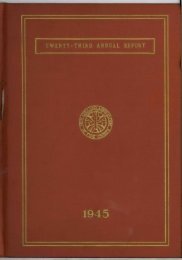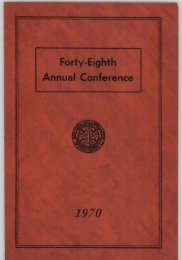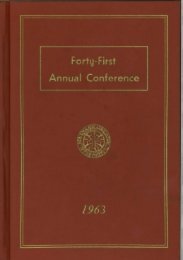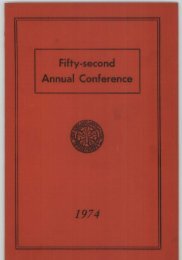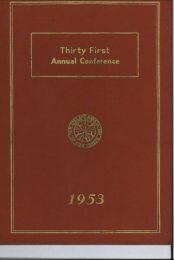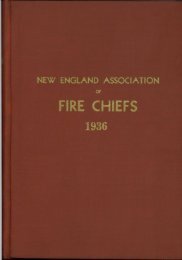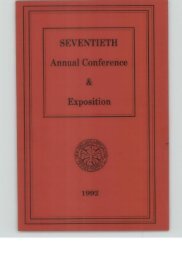NEAFC 32nd Annual Conference.pdf - New England Association of ...
NEAFC 32nd Annual Conference.pdf - New England Association of ...
NEAFC 32nd Annual Conference.pdf - New England Association of ...
Create successful ePaper yourself
Turn your PDF publications into a flip-book with our unique Google optimized e-Paper software.
NEw ENGLAND ASSOCIATION OF FIRE CI-IIEFS<br />
Under Common Law, the crime o1~ Arson was well defined by Blackstone<br />
as ’~the malicious and wilt?ul burning ot? the house <strong>of</strong> another," but since that<br />
time, an avalanche ot? statutes has overwhelmed this definition, .so that its<br />
;ormer scope is interesting only in a historical sense. Where it was originally<br />
confined to dwellings and nearby buildings, it is now extended to all manner<br />
<strong>of</strong> structures, etc. Where it t?ormerly protected only the. habitation ot? man,<br />
it now covers personal property and even crops.<br />
Once, it was limited to burning the house ot? another, and now, one may<br />
be convicted if he burns his own property. Arson has always, been regarded<br />
by the law as a heinous and most aggravated <strong>of</strong>fense, for not only does. it<br />
endanger human life and the security <strong>of</strong> habitation’s, but it evidences a moral<br />
recklessness and depravity in the perpetrator. The <strong>of</strong>fense is. marked with the<br />
most deliberate and atrocious malice. It is. not perpetrated in the heat <strong>of</strong><br />
passion, but coolly and stealthily, and without any view <strong>of</strong> pecuniary gain, and<br />
the consequences are such as no mind which is not utterly hardened and depraved,<br />
can even contemplate with complacency.<br />
"The crime <strong>of</strong> Arson is one ot? the most heinous in all the catalogue."<br />
Blackstone ingeniously compares Arson with murder and indicates.<br />
preferential regard t?or the murderer.<br />
"This is an <strong>of</strong>fense <strong>of</strong> very great malignity,-and much more destructive to<br />
the public than simple theft, because:<br />
"1. It is an <strong>of</strong>fense against that right <strong>of</strong> habitation; which is acquired<br />
by the law <strong>of</strong> nature, as well as by the law <strong>of</strong> society;<br />
"2. Because <strong>of</strong> the terror and confusion that necessarily attend it; and,<br />
¯ "3. Lastly, because in simple theft, the thing stolen-only changes its<br />
master, but still remains in use for the benefit <strong>of</strong> the public, whereas by buming,<br />
the very substance is destroyed."<br />
It is als0 frequently more destructive than murder itseif, <strong>of</strong> which, too,<br />
it is <strong>of</strong>ten the cause, since murder, atrocious as it is, seldom extends beyond<br />
the ;elonious act designed, whereas fire too frequently involves, in the common<br />
calamity persons unknown to the incendiary, and not intended to be hurt by<br />
him, and friends, as well as enemies.. It. was. a capital <strong>of</strong>fense until more<br />
lenient statutes were reinacted in the 19th Century.<br />
Arson, burning to defraud the insurer, and reii~d Crim~s,are most<br />
generally, if not invariably, committed under the cover <strong>of</strong> darkness., at times<br />
and in a manner calculated to divert suspicion, and where no living being<br />
other than the criminal himself or those who are acting in concert with<br />
him can be present as eye witnesses, ihereto. In such cases, it is. almost invariably<br />
true that the detection and conviction <strong>of</strong> the criminal must be based<br />
on circumstantial evidence, at least in part.<br />
A learned author once said, and I quote:<br />
"Circumstances! are invincible pro<strong>of</strong>s.. They will not bend to the<br />
inclination <strong>of</strong> parties. Witnesses may be mistaken, may be corrupted;<br />
things can do rieither~ and therefore, so far as they do, deserve unlimited,<br />
unreserved faith. Circumstances cannot lie."<br />
Where presumption necessarily arises from circumstances, it is more<br />
convincing and satisfactory pro<strong>of</strong> than any other kind <strong>of</strong> evidence because facts<br />
cannot lie.<br />
171



